 Petzlover
Petzlover Manchester Terrier is originated from United Kingdom but Tsvetnaya Bolonka is originated from Russia. Both Manchester Terrier and Tsvetnaya Bolonka are having almost same height. Both Manchester Terrier and Tsvetnaya Bolonka are of same weight. Both Manchester Terrier and Tsvetnaya Bolonka has almost same life span. Both Manchester Terrier and Tsvetnaya Bolonka has almost same litter size. Manchester Terrier requires Low Maintenance. But Tsvetnaya Bolonka requires Moderate Maintenance
Manchester Terrier is originated from United Kingdom but Tsvetnaya Bolonka is originated from Russia. Both Manchester Terrier and Tsvetnaya Bolonka are having almost same height. Both Manchester Terrier and Tsvetnaya Bolonka are of same weight. Both Manchester Terrier and Tsvetnaya Bolonka has almost same life span. Both Manchester Terrier and Tsvetnaya Bolonka has almost same litter size. Manchester Terrier requires Low Maintenance. But Tsvetnaya Bolonka requires Moderate Maintenance
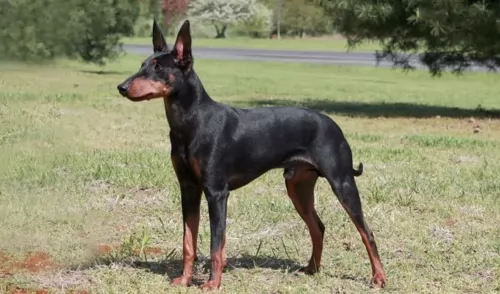 Looking much like the Black and Tan Terrier, the Manchester Terrier is a dog that was actually developed from the Black and Tan, which is the oldest known breed of terrier.
Looking much like the Black and Tan Terrier, the Manchester Terrier is a dog that was actually developed from the Black and Tan, which is the oldest known breed of terrier.
In the United States there are 2 varieties of the Manchester Terrier — the Toy and the Standard but in the UK the 2 sizes are classified as different breeds - the English Toy Terrier and the Manchester Terrier.
The dog was first bred in the 19th century to wipe out rats and mice, originating from Manchester, England. This is an old dog breed, gaining the nickname of the Gentleman's Terrier because of its dignified looks and personality.
After the 2nd World War, the numbers of the dog dropped and this spurred the kennel club to list it as a vulnerable native breed, in danger of extinction. It was in 1937 that the British Manchester Terrier Club was formed.
 It is believed that the dog’s ancestors are the Toy Poodle, Pekingnese, Bichon Frise and Shih Tzu. The Russian Tsvetnaya Bolonka has also become more well known since the British royal couple, Willam and Kate, have them as pets.
It is believed that the dog’s ancestors are the Toy Poodle, Pekingnese, Bichon Frise and Shih Tzu. The Russian Tsvetnaya Bolonka has also become more well known since the British royal couple, Willam and Kate, have them as pets.
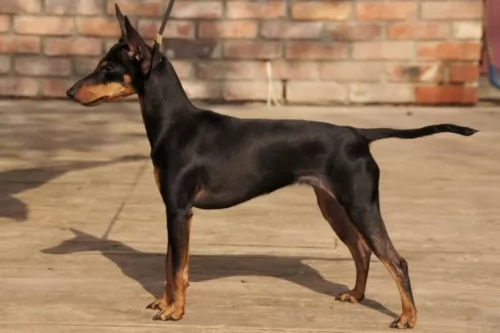 The Manchester Terrier is a small, smooth haired dog with a black and tan coat and a head with a fairly long muzzle, small bright eyes, largish erect ears and a deep chest.
The Manchester Terrier is a small, smooth haired dog with a black and tan coat and a head with a fairly long muzzle, small bright eyes, largish erect ears and a deep chest.
The body is lean and muscular and the tail, where once docked, now tends to be left long. In the toy sized dog you will find him standing at roughly 25 – 30cm in height and he will weigh between 2 to 4kg. The standard sized dog will be slightly taller and heavier and weigh in the region of 8kg.
You can expect between 2 – 4 puppies from a breeding pair.
Feisty, energetic, alert and intelligent are some of the words which describe the Manchester Terrier. Like any other dog, training and socialization will make him a splendid pet, obedient and amicable among people.
He is loving and loyal, courageous and feisty and guaranteed to make you an eager-to-please pet. He can adapt to life in the city or countryside, but is going to need plenty of exercise wherever you keep him as a pet.
 The Tsvetnaya Bolonka is a small dog standing at 22 – 27cm in height and weighing between 2 and 4kg. He has been developed to be a companion dog.
The Tsvetnaya Bolonka is a small dog standing at 22 – 27cm in height and weighing between 2 and 4kg. He has been developed to be a companion dog.
The long coat of the dog is wavy or curly and is a grey color, brown, red, white or black. The males have a beard and mustache.
Allergy sufferers appreciate that the dog doesn’t shed but the coat will need to be brushed to prevent matting. The ears are medium length and the tail curls up over the back.
These dogs are sturdy, happy, social, playful little dogs with a loving, loyal temperament. They’re balls of fun and make super playmates of disciplined children who have been taught to be kind and gentle with animals.
They are well balanced, amicable dogs with a streak of independence. They’re intelligent too and will respond well to training and socialization.
He isn’t aggressive and isn’t a yapper either. He is a friendly dog, even with strangers but he can still prove to be a good watchdog. Small and compact, he can do well in the countryside or the city.
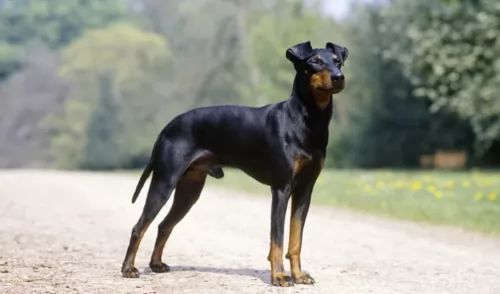 The Manchester Terrier has so many good qualities that make him such a good pet. Low maintenance, he is clean and well groomed to look at. He is also a healthy dog breed, nice and active and low maintenance.
The Manchester Terrier has so many good qualities that make him such a good pet. Low maintenance, he is clean and well groomed to look at. He is also a healthy dog breed, nice and active and low maintenance.
This little dog is willing to come into your home and heart. He will make you a wonderful pet and friend for as long as 15 years if you take special care of him.
 The Tsvetnaya Bolonka is a true companion being even-tempered, intelligent and friendly. He has been specifically developed as a companion dog whether you live in the city or the countryside.
The Tsvetnaya Bolonka is a true companion being even-tempered, intelligent and friendly. He has been specifically developed as a companion dog whether you live in the city or the countryside.
He gets on well with children and with other pets in the home and even towards strangers. Just remember that wherever you choose to live with your sweet little pet, he will still need regular exercise to remain the feisty, happy little dog he is.
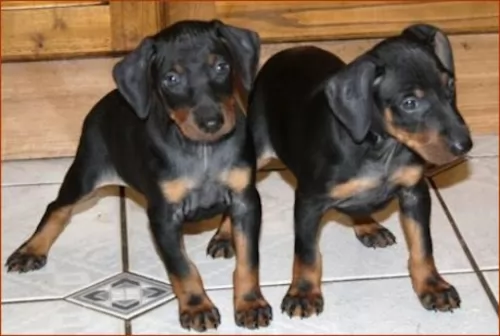 This dog breed is fairly healthy and can reach a good age if looked after well. Every dog though, can be affected by a number of inheritable genetic disorders.
This dog breed is fairly healthy and can reach a good age if looked after well. Every dog though, can be affected by a number of inheritable genetic disorders.
Glaucoma is a common genetic condition in Terrier breeds, including the Manchester Terrier. Secondary glaucoma, which is known as lens luxation is brought about when there is excessive pressure in the eyeball. The lens of the eye is put out of alignment. Most times surgery is the solution.
Von Willebrand's Disease is a blood disorder that affects the clotting process. A dog with this disease will have bleeding gums, continuous bleeding after surgery and sometimes blood in the stool. It’s a disease which can’t be cured but it can be managed with treatments.
 This breed may get some of the typical small-dog health conditions. These can be things such as dental problems, obesity and Patellar Luxation.
This breed may get some of the typical small-dog health conditions. These can be things such as dental problems, obesity and Patellar Luxation.
Small dogs often have problems with their knees, and patellar luxation is a common orthopedic condition for small dogs. You’ll see your dog walking on 3 legs.
A luxated kneecap can move out of place, but in some more serious instances, it can dislocate completely. Treatment will require a visit to the vet. Sometimes surgery is required.
Small dogs are more prone to dental disease than large dogs. Tartar and plaque form, there is gum recession, and loss of teeth is common with these little dogs.
Check inside his mouth regularly. Brushing the teeth can be of value to the dog and you get special canine dog and toothpaste. A tooth infection can be serious for your pet and cause him to have toxins circulating in the bloodstream that can make him sick.
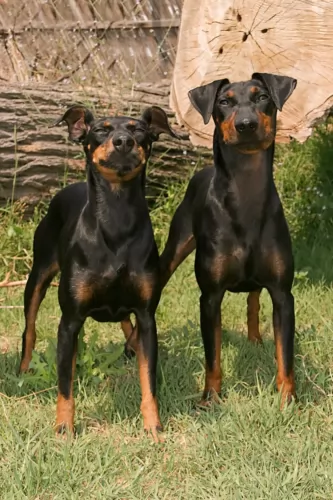 Low maintenance, the Manchester Terrier will only require a brushing once or twice a week. Check his eyes and ears for infections, clip his nails and brush his teeth 2 or 3 times a week.
Low maintenance, the Manchester Terrier will only require a brushing once or twice a week. Check his eyes and ears for infections, clip his nails and brush his teeth 2 or 3 times a week.
The Manchester Terrier is a lean, muscular dog and you want to be sure to keep him that way. If you feed him commercially manufactured food, make sure that it is one of the high quality brands – food which is packed full of vitamins and minerals to ensure the health of your dog.
Any packaged food you buy should be appropriate to the dog’s age and his activity levels. You won’t be doing your dog a favor by feeding him treats that you enjoy such as chocolate, coffee, peanuts, raisins, grapes and onions.
Dogs want simple food that don’t change much. Keeping things simple prevents upset stomachs. Give him some wholesome home-made food occasionally to add into his dry kibble. This can be boiled chicken, brown rice or pasta and some cooked or raw vegetables such as potatoes, carrots and spinach. Some raw meat added in from time to time can also do wonders for your dog. Make sure he has access around the clock to fresh, cool water.
The Manchester Terrier wants lots of exercise, and apart from him having his regular daily walks, he will need runs off the leash in the park. If you go cycling for instance, he will readily run beside you.
 These little dogs will need a walk each day. They also love all sorts of games both indoors and outside.
These little dogs will need a walk each day. They also love all sorts of games both indoors and outside.
Brush the hair regularly to avoid matting. Many people tie the hair around the face into a ponytail. If the hair becomes dirty, it can be gently shampooed with a mild, natural shampoo and conditioned. The wet hair will require a wide-tooth comb to comb the hair.
Feed your dog the best dry kibble that there is. Check the packaging and make sure the ingredients are the best, full of vitamins and minerals. Try to give him some tasty home-made food such as boiled chicken, brown rice and vegetables. Remember to chop it up very finely. Never give your dog foods such as chocolate, popcorn, peanuts, and spicy food. It can upset his stomach. Make sure he has constant access to fresh, cool water.
Get your little pet to the vet if he shows signs of illness and make sure his vaccines are up to date to avoid deadly canine illnesses.